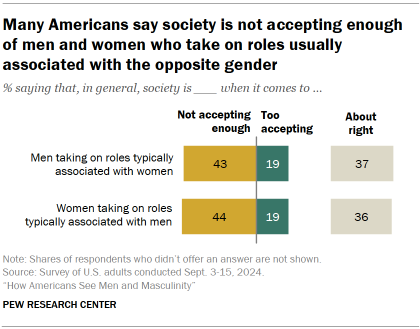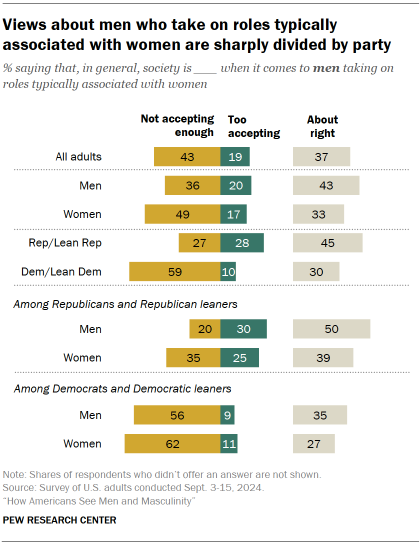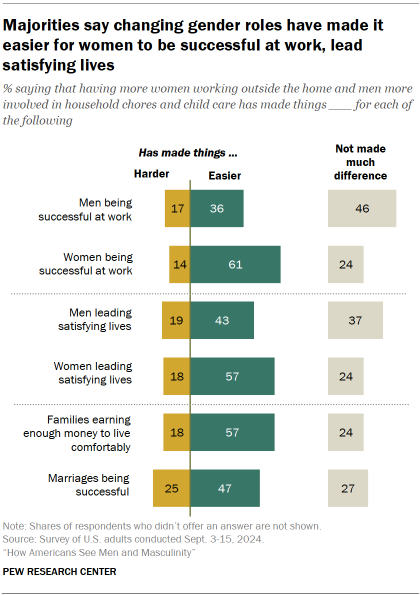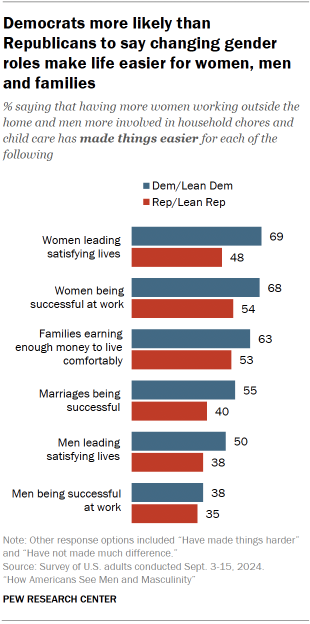We asked Americans a series of questions about changing gender roles for men and women. First, we asked if society is too accepting or not accepting enough of men and women who take on roles typically associated with the other gender. On balance, the public thinks society is not accepting enough of men and women who do this.

Overall, 43% of adults say society is not accepting enough of men who take on roles typically associated with women, 19% say society is too accepting of these men and 37% say acceptance is about right.
When we asked about women who take on roles typically associated with men, the results were almost identical. Some 44% say society is not accepting enough of women who do this, 19% say society is too accepting and 36% say things are about right.
Differences by gender
Women are more likely than men to say that society is not accepting enough of men who take on roles typically associated with women (49% vs. 36%), while men are more likely than women to say acceptance is about right (43% vs. 33%).
In addition, a higher share of women than men say society is not accepting enough of women who take on roles usually associated with men (53% vs. 35%). Again, men are much more likely than women to say things are about right (42% vs. 30%).
Differences by party
Republicans and Democrats have very different views on these issues. On balance, Republicans and Republican-leaning independents are about evenly divided on whether society is too accepting (28%) or not accepting enough (27%) of men who take on roles that are usually associated with women. Some 45% of Republicans say things are about right.

Democrats and Democratic leaners tilt heavily toward the position that society is not accepting enough of men who take on women’s roles. About six-in-ten Democrats (59%) say this, while only 10% say society is too accepting of these men and 30% say things are about right.
The partisan pattern is very similar on the question of how society treats women who take on roles typically associated with men. Republicans are divided over whether society is too accepting or not accepting enough of these women, while a majority of Democrats say society is not accepting enough.
Across gender groups within the parties, Republican men are the most likely to say that society is too accepting of men who take on roles often associated with women (30% say this) and of women who take on roles associated with men (33%). Democratic women are the most likely to say there’s not enough acceptance for these men (62%) and women (69%).
How have changing gender roles impacted men and women?

We also asked Americans about the impact of having more women working outside the home and men more involved in household chores and child care. Overall, the public thinks the changing roles of women and men in our society have been more beneficial for women than for men.
When it comes to being successful at work:
- 61% say changing gender roles have made it easier for women.
- 36% say they’ve made it easier for men.
And when it comes to leading satisfying lives:
- 57% say changing gender roles have made it easier for women.
- 43% say they’ve made it easier for men.
The public also sees more benefit than harm from changing gender roles for married couples and families:
- 57% say changing roles have made it easier for families to earn enough money to live comfortably.
- 47% say they’ve made it easier for marriages to be successful.
Differences by gender
Men and women are mostly in agreement about the impact changing gender roles have had on the areas of life we asked about. Women are somewhat more likely than men to say these changes have made it easier for women and men to lead satisfying lives and for marriages to be successful. Still, on balance, both men and women see these changes as more beneficial than harmful.
Among women, those with a bachelor’s degree or more education are significantly more likely than those without a four-year college degree to say changing gender roles have been beneficial across almost all items. For example, 67% of women with at least a bachelor’s degree, compared with 55% of women with less education, say these changes have made it easier for women to lead satisfying lives.
The one exception is on the impact changing gender roles have had on men’s ability to be successful at work. Here, 40% of women without a four-year college degree say these changes have made it easier for men to be successful, while only 32% of women with at least a bachelor’s degree say the same.
Differences by party
Democrats and Republicans have differing views on the impact changing gender roles have had on women, men and families. By significant margins, larger shares of Democrats than Republicans say changing gender roles have made each of the following easier:

- Women leading satisfying lives (69% vs. 48%)
- Women being successful at work (68% vs. 54%)
- Families earning enough money to live comfortably (63% vs. 53%)
- Marriages being successful (55% vs. 40%)
- Men leading satisfying lives (50% vs. 38%)
- Men being successful at work (38% vs. 35%)
For their part, significant shares of Republicans say changing gender roles have made certain aspects of life harder. A third of Republicans say these changes have made it harder for marriages to be successful, compared with 18% of Democrats who say the same. A quarter of Republicans (versus 13% of Democrats) say the changes have made it harder for men to lead satisfying lives. And 24% (versus 11% of Democrats) say they’ve made it harder for women to lead satisfying lives.




